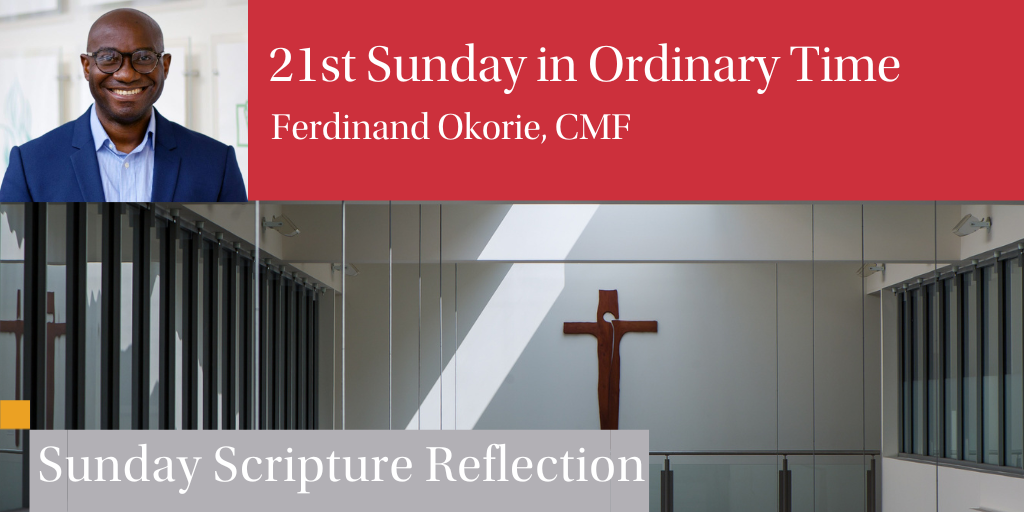
Readings:
Reading I: Isaiah 22:19-23
Psalm: 138:1-2. 2-3, 6, 8
Reading II: Romans 11:33-36
Gospel: Matthew 16:13-20
“You are the Christ, … And I say to you, you are Peter” (Matt 16:16, 18)
One of the exhortations at liturgical celebrations is the belief that an encounter with Christ is an experience of faith and growth in the knowledge of Christ, which disposes the believer to imitate the life of Christ in the world. It seems obvious then that as Jesus grew in popularity among his contemporaries, the impactful difference he made in the lives of those who encountered him on the streets of the towns and villages of Palestine left them wondering about Jesus’ divine gifts, identity and his role in the history of God’s presence to the children of Israel. To some, Jesus possessed the presence and charisma of Elijah, replicating for the generation of Jews in the first century the prophetic activities of Elijah, who invited his contemporaries, during the time of King Ahaz, to a life of fidelity and trust in God. Elijah’s words were accompanied with mighty deeds (see 1Kings 18:36-37). Those who identified Jesus as Jeremiah linked Jesus Christ to the leadership of Jeremiah, who became a sign of God’s presence to his contemporaries in need of a leader to lead them on the right path in their relationship with God when leadership and poor alliances failed Judeans as Babylon political expansion and dominance grew (see Jer 32:1-5). Some linked Jesus to John the Baptist, who was a fearless critic of Roman imperialism in Palestine. They saw in Jesus’ ministry a continuity from that of John the Baptist because of his strong voice against the overreach of religious and political leaders (see Matt 3:7-12; 14:3-4).
But these prophets who represented the presence of God among God’s children are not true representatives of the identity of Jesus. Seemingly, Jesus rejected the comparison with Elijah, or Jeremiah or John the Baptist given the poignant question directed to those who have joined him in his public ministry throughout Palestine: “who do you say that I am?” I believe that by personalizing the question about his true identity, Jesus invited his followers to draw their response from their own personal experiences of being his disciples, learning and sharing in the ministry of the good news of life that God has offered to the world through Jesus Christ. In his characteristic manner of assuming the position of the voice of the group, St. Peter’s response revealed perception and divine revelation. There is no reason to doubt that St. Peter’s response came from his own personal experience of Jesus’s ministry of teaching, healing and proclaiming the good news of the reign of God in the world. St. Peter called Jesus “the Anointed Son of God.” St. Peter recognized Jesus as the fulfillment of God’s promise of a leader to liberate God’s children from sin and death.
Notice that following St. Peter’s confession of Jesus’ true identity is a commissioning pronouncement, and St. Peter’s public installation to lead the church (Matt 16:18-19). The experience of St. Peter in the gospel reading reveals to me that to know Christ, and to confess Christ’s divine identity are as a result of the individual’s growth in relationship of faith with Christ plus living a life of sharing in the ministry of God’s plan for the salvation of the world, which Jesus inaugurated. Therefore, what we learn from St. Peter’s confession is that faith in Christ is not a passive response to God’s gratuitous gift of life through Jesus Christ, but rather, it is a disposition to be actively involved, and sharing in the ministry of Jesus Christ. We can discern the same experience with Eliakim, son of Hilkiah in the first reading. Yahweh called him “my servant” thereby preparing him for leadership over Jerusalem and the house of Judah, and Yahweh installed the ceremonial robe and sash of authority on him (Isaiah 22:21). Just as other servants of God in the book of Isaiah (Isaiah 41:8, 9; 42:1-4; 49:1-6; 50:4-9; 52:13-53:12), likewise Yahweh will use Eliakim as an instrument to accomplish God’s leadership of the children of Israel. For this reason, therefore, the duties and responsibilities of Eliakim were under God’s mandate because he has shown fidelity and dedication to Yahweh’s leadership of the children of Israel, and he was far more disposed than his predecessor to collaborate with God.
As we reflect on the lectionary selections for today’s liturgy, let us keep in mind that the experiences of Eliakim and St. Peter speak to us on the essence of our relationship with God that includes coming to know God’s presence to us and in our world, and growing in deep faith and commitment to how God uses us to accomplish the divine plan for justice, peace, equality and dignity of the human person and the integrity of creation. Therefore, with a firm faith in God self-revelation through the Jesus Christ, and our commitment to union with Christ, let us then share in the leadership of our world as God’s children to promote human flourishing and protect the earth, our common homeland.
Ferdinand Okorie, CMF
Vice President and Academic Dean
